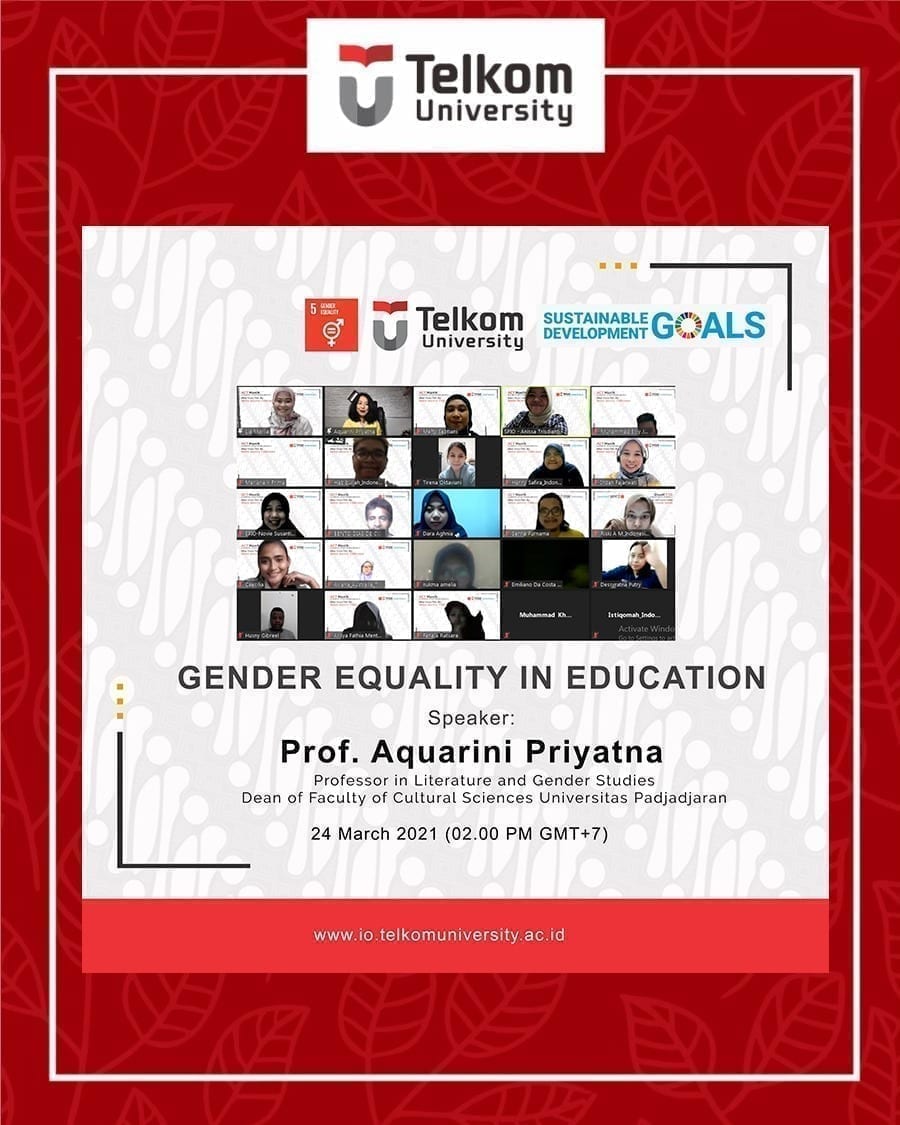
Gender Equality in Education, ACT #3
Gender Equality in Education, ACT #3. After Class Talk #3 on The Sustainable Development Goals (SDGs) series back on the table with more exciting topic. Lifting the fifth SDG goal–Gender Equality–on Wednesday, 24th March, 2021 the International Office Telkom University invited a well-known expert in the study of gender and feminism issues, Prof. Aquarini Priyatna.
Attending by more than 60 participants, the gender discussion which lasted one and a half hours opened the participants’ insights into how this understanding of equality is often out of place, especially in the world of education.
According to Ms. Priyatna’s presentation, there are five concerning issues in Gender Mainstreaming in Education. First is Inadequate and stereotypical gender-biased teaching materials. For example, the teacher introduces to student that “Women are good at cleaning and cooking; Men are good at making things.” The second one is inadequate facilities for gender, particularly regarding learners with special needs. Also gender biased curriculum and academic practices, gender biased recruitment of teaching staff and leadership, and the lack of resources for girl’s/women education. The issue of gender equality in education is dominated by information on the number of women who have dropped out of school. UNICEF even has world data and states that 10 people dropped out of school, 7 of whom were women. Child marriage is also become one of the buzzword of this issue.
Gender Equality in Education
She said that “every student should have equal access to high-quality education no matter where they come from. It also requires that all students be held to the same standards and goals regardless of their circumstances, abilities or experiences”. She also explained that Mainstreaming gender in education involves ensuring that a gender perspective and attention to the goals of gender equality are at the core of all development activities. and that there are a number of important things that must be considered in mainstreaming gender in education, they are:
- Ensure equal access to education
- Alleviate illiteracy among women
- Increase women’s access to various raining, science and technology, and further education
- Develop indiscriminative education and training
- Allocate adequate resources to monitor reform
- Promote lifelong education and training for women
Answering all these challenges, the United Nation through The Sustainable Development Goals (SDGs) echoed this awareness throughout the world about gender. And in line with that goal, Prof. Aquarini Priyatna suggests to “Rethink the Normative”. “Gender Role” must be rethought and readjusted-including the choice of expertise and studies.
Gender equality issue is not only a matter of how women’s rights are to be equalized, but the objective view is that as individuals, women have the same opportunity to develop and widen their actualization. As The 8th Secretary General of the United Nations, Ban Ki-Moon’s famous said those “Literate women are more likely to send their children, especially their girls to school. By acquiring literacy, women become more economically self-reliant and more actively engaged in their country’s social, political, and cultural life. All evidence shows that investment in literacy for women yields high development dividends.”
Closing this astonishing gender equality session, Prof. Aquarini Priyatna said that true equality is not cornering men and lifting women, but putting them in the right position. The right equality makes men happier too.
The After Class Talk 2021 presents two main topics about the Sustainable Development Goals (SDGs), and the International Student Series program which invites international students, professionals, and academics to deliver sessions sharing any area of interest and related to the UN Sustainable Development Goals (SDGs). There will be more upcoming interested topics on SDGs. So, stay tune, keep up your good health and don’t forget to register.(IO)***

